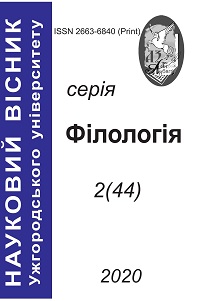CONCEPT-SCHEME VERBALIZATION BY MEANS OF ENGLISH PHRASEOLOGY
DOI:
https://doi.org/10.24144/2663-6840.2020.2.(44).251-254Ключові слова:
concept, cognitive linguistics, concept types, phraseological concepts, concept-scheme.Анотація
A number of issues is in focus of modern domestic and foreign cognitive research, among which special attention is drawn to the structure of knowledge representation by different types of concepts. The aim of the article is to carry out the analysis of concept-scheme verbalization by means of English phraseology. The article deals with the structures of knowledge storage in the human mind and their language projections; explores major approaches to the interpretation of the scientific notion of a concept-scheme and its place in modern cognitive studies; identifies specific features of concept-scheme verbalization as a unit of cognitive linguistics. The methods of dictionary definitions analysis, conceptual analysis, cognitive- semantic analysis have been used.
Most scholars in their definitions of concept emphasize its ability to reflect the most essential features and, thus, serve as the basis for generalization and representation of a number of similar sobjects of a certain class. Schemetic models are called specific schemetic representations of images in the form of trajectories, outlines, containers, etc. Such representations allow different concepts to be brought under one category on the basis of a common feature. The identification of such a classificatory cognitive feature explains the existence of a stereotype in the perception and interpretation of the world.
The study of phraseology as a means of rendering thought is a part of the general theory of linguistic conceptualization of the world, which is usually understood as the process of human cognitive activity, which results in the formation of a set of knowledge about the world. Considering the concepts-schemes expressed by fixed expressions of the English language, it was concluded that the main categories that are perceived by a person schemetically are, first of all, semes of measurement and quantity, because only in spatial terms a person can understand, for example, size, length or the width of any object. Special feature of phraseological concepts-schemes, in contrast with lexical, i.e. verbalized words with direct denotative meanings, testifies to the fact, that the rational meaning of phraseological units is encoded.

